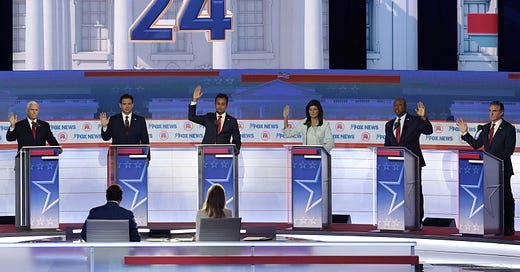Who Are They? Why Are They Here?
In the strange going-through-the-motions GOP debate, six of the eight candidates said they’d stick with Trump even if he were criminally indicted.

Remember Admiral James Stockdale?
“Who am I? Why am I here?” the Vietnam war hero and Ross Perot running mate asked self-deprecatingly during his introduction at the 1992 vice presidential debate.
Wednesday night’s Republican debate could have used some of that existential angst. Why did eight candidates, whose chances of winning the GOP nomination range from slim to infinitesimal, go to Milwaukee on a late summer evening to pretend otherwise?
For the first hour, there was almost no mention of the overwhelming favorite for the GOP nomination. Mike Pence might have vaguely alluded to an absent opponent, but there were almost no other references to him.
It took forceful prodding from an apologetic moderator for the candidates to finally engage Donald Trump—and even then, six of the eight candidates present raised their hands when asked if they would support a convicted felon for the presidency.
Florida Governor Ron DeSantis—who appeared to raise his hand only after seeing the five other hands go up—tried to evade a question about Pence doing the right thing on January 6th before allowing he had no “beef” with the former vice president’s performance of his duty.
Biotech entrepreneur-turned-anti-woke crusader Vivek Ramaswamy played the role of Trump, with breezy I alone can fix it assuredness and dark intonations about a “cold civil war.” Ramaswamy might have lost his confrontations with Pence and Nikki Haley on points, but his MAGA supporters probably won’t see it that way. The audience in the room certainly seemed to appreciate his pugnacity.
Haley, the only woman on stage, turned in a surprisingly strong performance, capably defending her views on abortion and making an impassioned defense of American support for Ukraine.
Yet despite principled arguments about the Constitution and the rule of law from Pence, Chris Christie, and Asa Hutchinson, there seemed to be little interest from the remaining candidates in attacking the frontrunner.
Given our polarized and excitable national political climate, it’s ironic that the GOP nominating contest has been such a low-intensity and predictable affair. It might be better to think of the Republican field not as candidates but as influencers trying to ever-so-slightly shape the direction of a zombified political movement that unsettlingly mimics familiar behaviors from the bygone GOP, like debating the national debt and abortion policy.
On reflection I probably wouldn’t have wanted to subject Admiral Stockdale to the pointlessness of last night’s debate.
Maybe the debate needed something more bracing, like the chaos of a Tammy Metzler speech asking everyone what was the point of it all.





